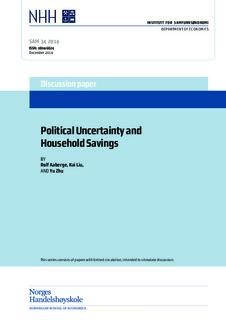Political Uncertainty and Household Savings
Working paper

Åpne
Permanent lenke
http://hdl.handle.net/11250/227064Utgivelsesdato
2014-12Metadata
Vis full innførselSamlinger
- Discussion papers (SAM) [657]
Sammendrag
Despite macroeconomic evidence pointing to a negative aggregate consumption response due to
political uncertainty, few papers have used microeconomic panel data to analyze how households
adjust their consumption after an uncertainty shock. We study household savings and expenditure
adjustment from an unexpected, large-scale and rapidly evolving political shock that occurred
largely in May 1989 in Beijing, China. Using monthly micro panel data, we present evidence that a
surge in political uncertainty resulted in significant temporary increases in savings among urban
households in China. Households responded mainly by reducing semi-durable expenditure and
frequency of major durable adjustment. The uncertainty effect is more pronounced among older,
wealthier, and more socially advantaged households. We interpret our findings using existing
models of precautionary behavior. By focusing on time variation in uncertainty, our identification
strategy avoids many of the potential problems in empirical studies of precautionary savings such
as self-selection and life-cycle effects.